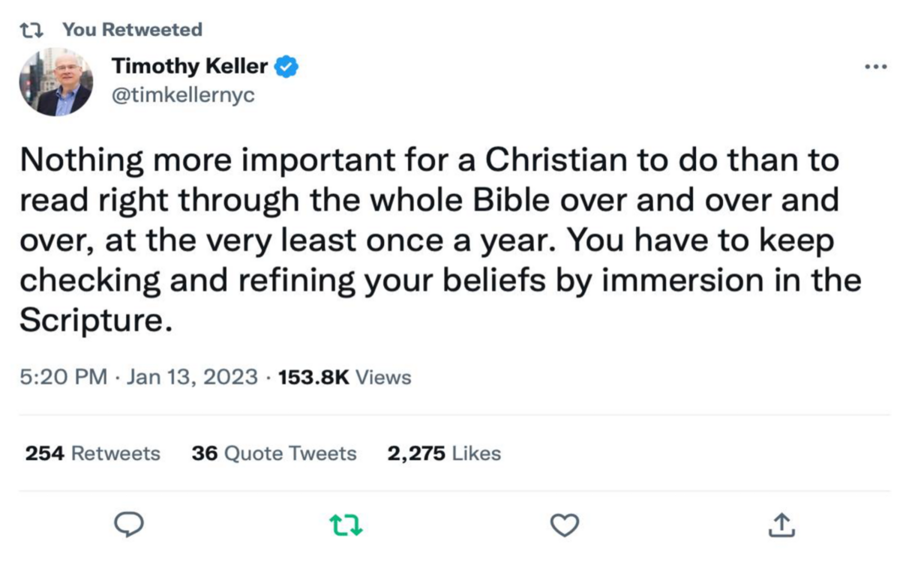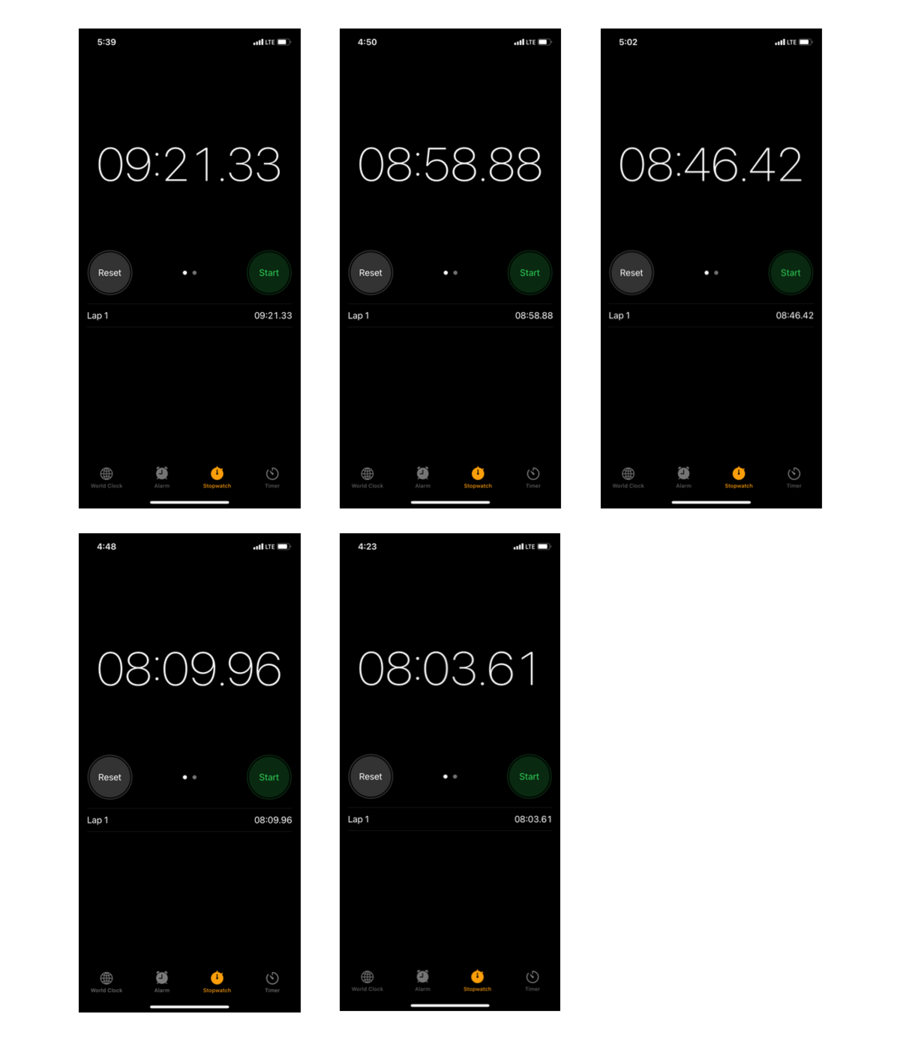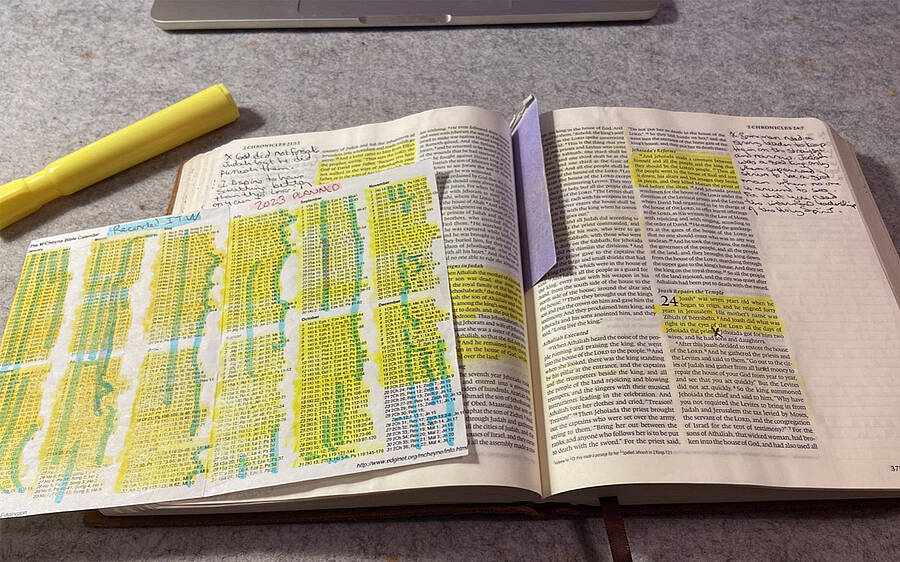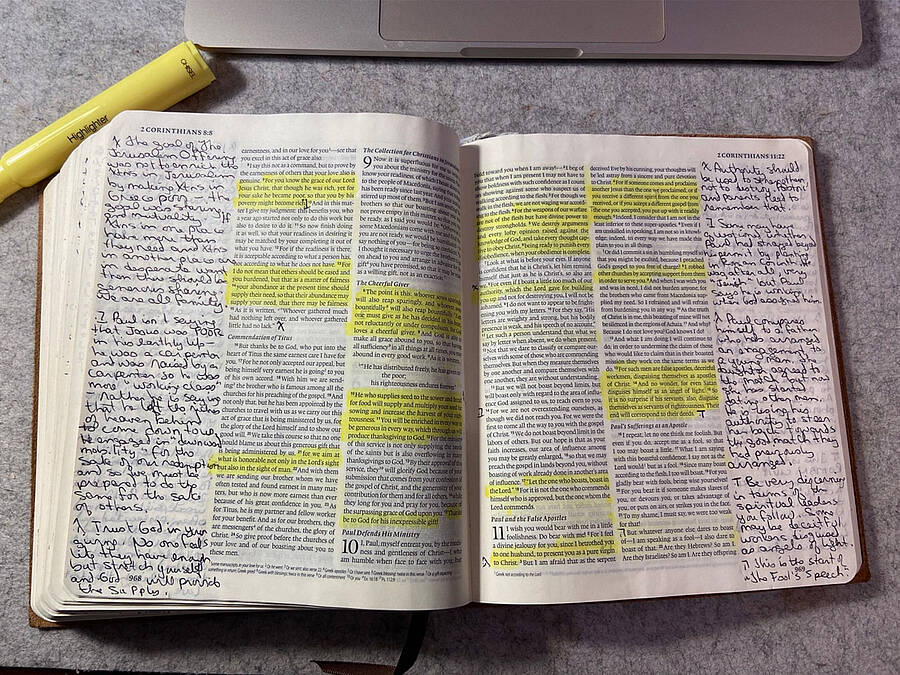
Last year around this time I retweeted something the late Tim Keller had posted that raised a bit of a ruckus on the interweb. I thought the tweet itself was innocuous:

A surprising number of purportedly literate people seized upon the phrase "nothing more important" as if they were unaware of how the English language actually works. In common parlance, saying that “there is nothing more important than” is simply a way of saying, "I cannot overstate the importance of". Keller was claiming that, in his estimation, it is difficult to overstate the importance of reading through the whole Bible year after year.
I couldn’t agree more!
The online kerfuffle caused by Keller’s tweet only served to prove his point. The internet has changed the way we think, the way we feel and the way we communicate. Social Media is training us to be more tribal, more reactionary, less reflective and less empathetic as human beings.
If ever there was a people who needed to read through the Bible in a year, it is us!
If ever there was a time to commend the healing power of Scripture reading and study, it is now!
As Samuel James points out in his excellent book Digital Liturgies, “Devices and practices that alter our habits of speaking and reading consequently alter our habits of learning and thinking.” [1]
The internet is rewiring our brains; reading through the Bible every year can rewire it back. The Word of God is a rock that we can anchor our minds to as we swim against the overwhelming current of the culture. Meditation, in our day and age, is a form of medication. Regular Scripture reading inoculates us against the infectious spirit of the age. As per Keller’s tweet, it is difficult to think of anything more important for the Christian than reading the Bible. The Word of God, if received in faith can:
Having it is a game changer – but getting it is transformative as well. As Marshall McLuhan pointed out, “the medium is the message”. How and where we receive information has a tremendous effect upon us. Developing a daily habit of Bible reading will change how you learn, how you think, how you speak and how you behave. Bible reading is every bit as “affecting” as spending time on Social Media.
Even more so.
Reading the Bible every day will create a posture of submission in your soul. The Social Internet positions you as a content creator. Your voice matters on Twitter. Your highly edited pictures matter on Instagram. Your 43 second video matters on TikTok.
You. You. You.
The Social Internet trains you to value your personal expression – reading the Bible teaches you to value hearing from God. Bible reading trains you to believe that God’s words matter more than your words. Bible reading trains you to expect truth to come at you from the outside. That impact alone will be worth the price of the discipline.
Like it or not, you are what you swim in, so in 2024 I recommend that you leave the shallows of the Social Internet to swim in the depths of God’s Word. If that is something you are interested in doing, then let me present to you a few habits and practices I have found helpful over the last several years.
Reading the Bible isn’t rocket science. There are 1189 chapters in the Bible and 365 days in a year. Therefore, you need to read roughly 3.25 chapters a day in order to make it all the way through. In theory, you could just start at the beginning of the Bible and read 3.25 chapters every day for the rest of the year, however, there are several potential difficulties in doing it that way. For one thing, you will yourself in a bit of a devotional desert come February 1st as you slam your way into the Book of Leviticus. It will also be a very long time until you get to hear directly from Jesus (October 12th, to be exact) so that may not be the wisest or most edifying way to go about it.
That’s where a good Reading Plan comes in.
I like the Robert Murray M’Cheyne (or RMM) Bible Reading Plan. I’ve been using it for years and have discovered several benefits. If you want to read a full article about the advantages of the RMM plan see here. The short version is this: you get to read 4 chapters every day from different parts of the Bible. This means, for example, that you are never only reading the Book of Leviticus. Leviticus is inspired and helpful but is not as immediately edifying and encouraging as most other parts of the Bible. On the RMM Plan you are receiving a balanced diet of history, law, Psalms and Gospel. Being in multiple sections of the Bible every day serves to remind the reader of the many promises and anticipations that are climactically fulfilled in the life and ministry of Jesus Christ.
If the RMM plan is not for you, I know many people enjoy the Discipleship Journal Plan. This plan was developed by the Navigators and is laid out similarly to the RMM Plan with its four-column approach. What people like about this plan is that it you get 5 days off a month which you can use to rest or catch up if you’ve fallen behind. Also, unlike the RMM plan, it does not double up on the Psalms and New Testament – that buys you the 5 days off a month and makes the plan feel a little bit more manageable than the RMM. You can find a version of that plan here.
Probably the third most popular plan, in terms of the folks I journey with, would be The Chronological Bible Reading Plan. This one is put out by the folks at ESV but, obviously, would work just as well with any version of the Bible. It bounces you around a little bit, which I find disorienting, as it tries to fit the readings into a harmonized timeline – so for example you will find yourself reading the Book of Job inside the Book of Genesis based on the assumption that Job was a chronological contemporary of Abraham – or at least the sons of Abraham. This is not my favourite way to read the Bible, but it might be useful for people trying to get a sense of the Biblical storyline as a whole. You can find a version of that plan here.
As with dieting, so with Bible reading – the secret is not finding the perfect plan. The secret is picking a plan and sticking to it.
There is no such thing as “finding time” to do something important. There is no extra time to be found! People fill up their days and use their allotted hours doing things that matter to them. As it is with eating, sleeping, working and loving – so will it be with reading the Bible. If it is important to you, you will make the time.
The key is priority and habit.
Priority is a matter of the heart, habit is a matter of planning, routine, and repetition. I’m guessing that you don’t have to motivate yourself to brush your teeth in the morning. I’m guessing you almost never show up to work without pants. Why? Because brushing your teeth and putting on pants has become a daily habit. Your mother made you do it every day at the same time for enough days in a row that it became a fixed routine – so will it be with your Bible reading plan. If you do it at the same time, at the same place, in the same way for 30 days in a row, you will probably do it that way for the rest of your life.
Habits are powerful!
Once something becomes a habit, it takes effort and intention not to do it. Making a habit involves planning and intentionality. Decide today to set your alarm 30 minutes earlier than you set it yesterday.
That’s it. That’s literally 90% of what you need to do to start this habit. It takes about 25 minutes a day to read through the Bible in a year, so wake up half an hour earlier, find your spot, create your routine and develop a habit that will dramatically change and improve your life.
I do my Bible readings in the morning. I have 5 kids so that tends to be the time when the house is quietest. I wake up and shave and shower first, otherwise I am just not alert enough for the process to have maximum value. I make coffee and I sit at my desk and open my Bible and read.
I can honestly tell you that I have followed this practice probably for 363 days out of every 365 day year since 2012. Christmas morning is a little squirrely in my house – and usually I am sick as a dog at least one day a year – but other than that – this is how my day begins.
Every day.
It is a choice.
It is a habit.
It is a lifestyle.
We are living in a Golden Age when it comes to reading and studying the Bible. Twelve years ago when I started doing this, the only real “tools” that were available were in the very primitive stage of development. I used to have a briefcase in my car filled with CDs that had the NKJV version of the Bible on them, but they were so cumbersome and so inflexible that I gave up on trying to use them. It would have taken 4 separate CDs every day to track with the RMM reading plan, which is simply not feasible or safe to do while driving a car.
Things are significantly better now.
The YouVersion app allows you to pre-load your preferred version and plan and it will use push notifications to send you the audio or print files that you need to stay on track with your plan.
Crossway has a very popular app that will read to you from the ESV version of the Bible.
For the last five and a half years I’ve been developing a program called Into the Word. We work our way verse by verse and chapter by chapter through whole books of the Bible. So far, we’ve covered more than 500 chapters, or 42% of the Bible. I read the text and provide “pastor level” commentary as to the meaning and application of the passage. I started it as a resource for the commuters in our church but by the grace of God we’ve had over a million episode plays a year for the last two years. You can find our complete library of episodes at our website intotheword.ca, or you can download the Into the Word app at the App Store or on Google Play. We release the chapter episodes that correspond with the RMM daily readings on iTunes.
If you listen to even one chapter a day using these sorts of tools it will reduce the amount of time you need to spend reading to as little as 15 minutes. It’s amazing to think what a difference you can make in your life with such a small amount of time!
Most people are motivated by indications of progress. This past spring, I decided to start running again. I’m about to turn 50 so I’ve been out of the running game for about a decade now, but I read that it can be really helpful for guys my age to run shorter distances at maximum pace. I used to run 10 km multiple times per week, but I had to give it up because of the impact on my ankles and knees. But running 1 mile at max pace is good for the heart with minimal impact on the joints. I decided to give it a try. My first attempt was somewhat disappointing – aside from the fact that it nearly killed me! My time was a long way off what I used to be capable of. It was well north of 9 minutes! However, as the summer went on, I got nearer and nearer to my goal of 8 minutes, which, according to the health website, is very good for a man of my age. I started keeping screenshots to record my progress.

Watching that time creep down toward the target kept me motivated. The same is true with Bible reading!! I use the standard A5 chart for the 1 year version of the RMM Bible Reading Plan (you can find one here). Every day when I complete my four readings, I highlight the chart row in yellow. As of December 19th, 2023 my chart looks like this:

The blue highlighting represents chapters that we’ve already covered in the Into the Word audio program, the yellow highlighting represents days completed in the reading plan. Those coloured lines are highly motivating!
Of course, the main reason we reason we read the Bible every day is to grow in our knowledge and appreciation of Jesus.
Amen!
However, as a human being I am subject to normal human motivations, and there is absolutely nothing sinful about that. The Apostle Paul told Timothy:
“Practice these things, immerse yourself in them, so that all may see your progress.” (1 Timothy 4:15 ESV)
Human beings are encouraged by progress! We are encouraged by the progress we see in others and we are encouraged by the progress we see in ourselves.
Go with it!
Excessive piety is bad for the soul. If Paul thought that Timothy and the Ephesians would be helped by the tracking and acknowledgment of progress, then I’m sure the same is true for you and me.
Track your reading every day with a highlighter. If you miss a day, or if you tend to miss a fair number of days, then use the same chart for multiple years in a row and use a different colour to track your progress each year and after a year or two you will be encouraged to see that you have read every chapter in the Bible at least once, and most chapters multiple times.
Human beings need that kind of encouragement.
If tracking progress helps me run a faster mile, that’s a good thing. If it helps me wake up 30 minutes earlier to read my Bible every day, that’s an even better thing. As the Apostle Paul said:
“while bodily training is of some value, godliness is of value in every way, as it holds promise for the present life and also for the life to come.” (1 Timothy 4:8 ESV)
The spiritual life is not meant to be lived in isolation. Every gift that is given to us by God is meant to be shared with other people. When David received the gift of mercy from God, after his terrible sin with Bathsheba, he responded:
“Deliver me from bloodguiltiness, O God, O God of my salvation, and my tongue will sing aloud of your righteousness.” (Psalm 51:14 ESV)
Grace results in gratitude and gratitude results in praise! That’s the way the spiritual life is supposed to work. When we receive good things from God, we should immediately think of ways to share them with others.
When it comes to Bible reading, I have adopted the practice of writing words of praise and devotion in the margins of a journaling style Bible in the hopes that I can one day share my joy in Christ with my children and grandchildren. I use an ESV Journaling Bible from Crossway. There are a number of versions of this, but I prefer the double column version. There is a fair amount of space on the side for notes and I find it very exciting to watch as the pages fill up. It takes a while. The picture above shows one of the pages from 2 Chronicles, which, admittedly, does not tend to produce as many insights, praises and reflections as a page in Psalms or the Gospel of John or the letters of Paul. It might take me 4 or 5 times through 2 Chronicles to fill in the whole page, whereas I usually run out of margin on my first or second trip through one of the epistles, as per here:

Once you have a whole Bible filled with devotions and reflections you can pass it off to one of your children or grandchildren. If you want to learn more about how to turn a full journaling Bible into a precious family heirloom see here.
As I mentioned off the top, the internet – and the Social Internet in particular – teaches us to focus inward on ourselves; how we look, what we feel, how we identify. Reading the Bible orients us upward toward God. Reading the Bible while thinking about your children and grandchildren further orients your soul outwards towards those God has given you to love, teach, mentor and serve. Studying the Scriptures this way could be transformative, not just for you, but for your entire family for decades and generations to come.
I wish you all the best as you build this mind altering, soul purifying, thought changing, behaviour modifying, legacy building habit in 2024!
And may God alone be glorified!
Pastor Paul Carter
To find the complete library of Into the Word episodes by Pastor Paul see here. To read his most recent articles over at TGC Canada see here.
[1] Samuel D. James, Digital Liturgies: Rediscovering Christian Wisdom in an Online Age (Wheaton: Crossway, 2023), 53.